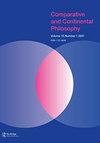The Way of Becoming-Imperceptible: Daoism, Deleuze, and Inner Transformation
IF 0.3
0 PHILOSOPHY
引用次数: 1
Abstract
ABSTRACT This essay brings together the discourses of Daoism and Deleuze and Guattari to elucidate the convergence among them on a fundamental metaphysical level that can open, for the receptive mind, a deeper intuitive insight and understanding of what a person is capable of doing and becoming, and how such a person can enter into a different relation with spacetime beyond the conventional understanding of it. After examining how vital energy (qi 氣) is transformed in internal alchemy (neidan 内丹), the focus turns to a consideration of the possible relation between Daoist “immortality” and Deleuzo-Guattarian “becoming-imperceptible.”* * This essay is the result of decades of bodily practices beginning with gongfu 功夫 (Sanhedao 三和道 style) followed by taijiquan 太極拳 (Wu 吳 family style) and eventually qigong 氣功, which informed considerably my later philosophical reflections. Parts of this paper have been presented previously at the Comparative and Continental Philosophy Circle, National Taiwan University, Taipei, Taiwan, March 25, 2016; the Australasian Society for Continental Philosophy, Western Sydney University, Australia, November 23, 2018, the Comparative and Continental Philosophy Circle, University of Leiden, Netherlands, May 24, 2019; and the Pacific Association for the Continental Tradition, University of Hawai‘i at Hilo, September 9, 2021. I am grateful for the opportunity to present my work at these societies and for the important critical feedback I received from their memberships. I also want to thank especially Meilin Chinn and Elisabet Yanagisawa for their many hours of conversation with me about my work on this topic.隐逸之道:道家、德勒兹与内在转型
本文将道家与德勒兹、瓜塔里的话语结合在一起,在一个基本的形而上学层面上阐明它们之间的融合,这可以为接受心灵打开一种更深层次的直观洞察和理解,即一个人能够做什么和成为什么,以及这样一个人如何超越传统的理解进入与时空的不同关系。在考察了生命能量(气)如何在内丹炼金术(内丹炼金术)中转化之后,重点转向了道教的“不朽”和德勒佐-瓜达里的“变得难以察觉”之间可能的关系。“* *这篇文章是几十年身体练习的结果,从功夫和道开始,然后是太极拳,最后是气功,这对我后来的哲学思考有很大的影响。本文部分内容已于2016年3月25日在国立台湾大学比较与大陆哲学研讨会上发表;澳大利亚西悉尼大学澳大利亚大陆哲学学会,2018年11月23日;荷兰莱顿大学比较与大陆哲学圈,2019年5月24日;和太平洋大陆传统协会,夏威夷大学希洛分校,2021年9月9日。我很感激有机会在这些学会展示我的工作,并感谢我从他们的会员那里得到的重要的批评反馈。我还要特别感谢陈美林和elisabeth Yanagisawa,她们就我在这个主题上的工作与我进行了长时间的交谈。
本文章由计算机程序翻译,如有差异,请以英文原文为准。
求助全文
约1分钟内获得全文
求助全文

 求助内容:
求助内容: 应助结果提醒方式:
应助结果提醒方式:


